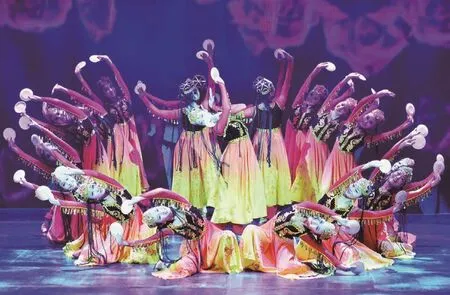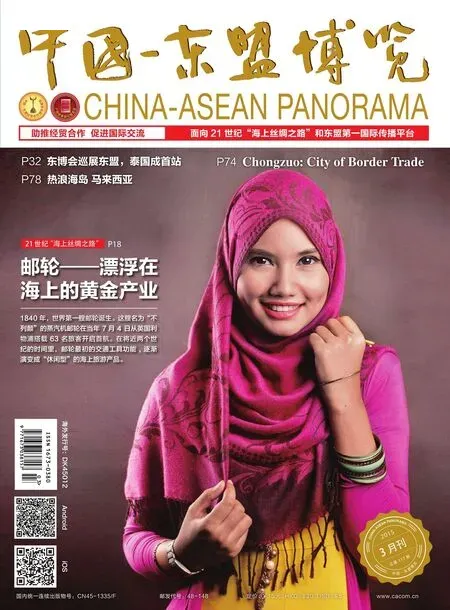A Maritime Silk Road for Cultural Exchanges
written by Li Min / translated by Ma Jinyu
A Maritime Silk Road for Cultural Exchanges
written by Li Min / translated by Ma Jinyu
Jackie Chan, the well-known Hong Kong film star, was awarded the honorary title of Datuk in the national palace of Malaysia, becoming a muchtold story for China-Malaysia cultural exchanges. Many scenes in his movies like “Police Story 3”, “Thunderbolt” and“Who Am I” were shot in Malaysia, which promotes the image of Malaysia as well as its Chinese language education.
ASEAN countries, such as Malaysia, Singapore and Thailand have tightly related with China in cultural exchanges. Interaction between actors of different countries and cooperation in TV dramas all can trace their profound sources. Against a backdrop of 2014 China-ASEAN Cultural Exchange Year, China and ASEAN countries conducted a series of cultural exchanges related to the 21st Century Maritime Silk Road, adding warmth to personnel and cultural exchanges.
Cultural exchange has long been an important channel for personnel flows and people-to-people contacts between nations, as it is rich in content and diverse in form. The implementation on building the 21st Century “Maritime Silk Road” helps both China and ASEAN countries embrace the goal of “people-to-people exchanges”. Reviewing the history of China-ASEAN cultural exchanges, close contacts lay sound foundation for people-to-people exchanges on Maritime Silk Road building and give an example for cultural and economic promotion.
Art Builds A Bridge for Cultural Exchanges
Leaders of China and ASEAN designated 2014 as the China-ASEAN Cultural Exchange Year. Activities related to performance, exhibition, film and television, tourism and youth exchanges, as well as special activities focusing on the Maritime Silk Road, overseas Chinese culture center and 40th anniversary of the establishment of China-Malaysia diplomatic relations were held throughout the year.
Throughout 2014, several Chinese professional art troupes performed in ASEAN countries and helped local people know about Chinese cultural tradition and modern art. “Colorful China” China Ethnic Art Troupe gave performances in Ho Chi Minh City, Vietnam in Spring Festival. A series of activities called “Best of China Performing Arts” were held in Indonesia.“Dynamic Yunnan” choreographed by Yang Liping, Chinese famous dancer appeared on the stage of Malaysia in December, 2014.
The characteristics of ASEAN were highlighted in the 2nd Asia Microfilm“Golden Crabapple” Prize Awarding Ceremony in China. With their works, filmmakers from Thailand, Malaysia, Singapore, Myanmar, Laos and Cambodia attended the award ceremony and movies like “The Memory of Cloud” (Thailand), “Fly”(Malaysia) and “Gift” (Singapore) took the crown.
Besides, silk road is being actively discussed by artists of China and ASEAN against the background of co-building the 21st Century “Maritime Silk Road”. “2014 China-ASEAN Cultural Exchange Year Painting and Calligraphy Exhibition” kicked off in Jakarta, Indonesia in December, 2014. With more than 300 art works, about 200 Chinese and ASEAN artists attended the exhibition and showed their expectation on the 21st Century “Maritime Silk Road”and people-to-people exchanges.
The Strength of Stars
Star power makes China-ASEAN peopleto-people exchanges more active andexcellent apart from mutual visits of art troupes.
In 2014, Malaysian singer Shila got famous for taking part in the Chinese TV music show “I Am A Singer Season 2”. Due to her outstanding performance, Chinese people turn the spotlight once again onto Malaysian stars who are in China, such as, Fish Leong, Penny Tai, Gary Chaw, Michael Wong, Victor Wong, Nicholas Teo, Yeoh Choo Kheng etc. Many stars from other ASEAN countries also enjoy high popularity in China like Singaporean singers Stefanie Sun, Ado, Tanya Chua, JJ Lin and Brunei singer and actor Chun Wu. They are all ambassadors for China-ASEAN cultural exchanges and play a positive role in people-to-people exchanges.
In 2011, Fish Leong was appointed as Malaysia’s tourism ambassador to China. In 2014, Chun Wu and his father visited Embassy of China in Brunei at the invitation of Zheng Xianglin, Chinese Ambassador to Brunei. Mr. Zheng said, with many fans in China, Chun Wu brings more people closer to Brunei. He expected Chun Wu to continue to play his positive role and promote people-to-people exchanges between China and Brunei.
Stars from China are influential in ASEAN countries as well. During the ASEAN-China Cultural Exchange Year, Zhang Jinlai (Liu Xiao Ling Tong), the actor who portrayed Monkey King in Chinese TV drama, headed a delegation to Myanmar and had his fans meeting in Yangon. He together with over 500 Myanmar fans recalled the story of “Journey to the West” and sang the song of peace and friendship. He was also awarded as the “Envoy of Myanmar-China Friendship” by the Myanmar-China Friendship Association.
The Strength of Culture

A series of activities called "Best of China Performing Arts" were held in Indonesia in August, 2014.
In recent years, some scenes in Chinese TV dramas have been shot in ASEAN countries and led a tourism mania in ASEAN countries. Investors realized that movie propaganda is cost-effective. Tourism authorities found a fresh way to advertise scenic spots. Non-governmental organizations sought out a new form for cultural exchanges. “Lost in Thailand” is the most representative one fi lmed in Thailand by Chinese director Xu Zheng.
“Lost in Thailand” has earned 1.26 billion yuan and boosted Thai tourism. Thai former Prime Minister Yingluck met with Xu Zheng and his crew staff. She appreciated the movie that promotes Thai tourism, and welcomed more Chinese directors to fi lm in Thailand.
Cultural soft power exerts great influence on box offi ce earnings and tourism benefi ts. The place where the film was taken often stimulates the tourism industry. A survey made by Ctrip shows that movie and TV tourism is highly accepted by tourists. 83% audience want to visit the locations where their favorite fi lms or TV dramas are taken. 91% participants believe, travel destination which is promoted by film or dramas is more comfortable.
With abundant travel resources, most sceneries in the ten ASEAN countries are charming, providing great locations for filming. In the context of co-building the 21st Century “Maritime Silk Road”and promoting China-ASEAN people-topeople exchange, the investment, fi lming and production on fi lm and television are viewed as a helpful attempt to promote bilateral cultural exchanges.
At present, an original film produced by Guangxi has been shot in Thailand, Vietnam and Cambodia and planned to have its world premiere in the summer of 2015. Thailand also sends out positive signal. For foreign actors and firms who shoot in Thailand, it will offer tax relief, including individual income tax and import tariff etc. In this way, more countries will be attracted to make films in Thailand, thus to increase its fi nancial revenue and boost tourism industry.
Cultural exchange has been continuing quietly, which warms the harmonious neighborhood between China and ASEAN. Under the new situation of cobuilding the 21st Century “Maritime Silk Road”, cultural exchange still has great vitality. China and ASEAN will make concerted eff ort to create a “Maritime Silk Road” for cultural exchanges with new thoughts and forms.

